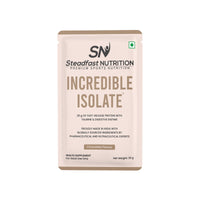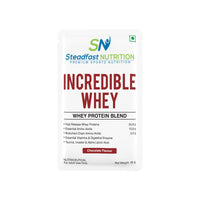Bodybuilding is undeniably challenging, yet when approached with precision, it has the potential to be one of the most gratifying and pleasurable sports. Achieving muscle growth is an integral part of the sport and involves more than just your workout routine - your diet, especially the amount of protein you consume, plays a crucial role as well.
A fundamental aspect of nutrition widely acknowledged by both seasoned and novice bodybuilders is protein for bodybuilders, which includes whey protein and casein. It's common knowledge that achieving muscle growth and a robust physique is impossible without an adequate protein intake. However, the question arises: How much protein is necessary? Is there a universally prescribed method for determining the required protein intake? There are multiple approaches to establishing protein requirements, each contingent on an individual's unique health and fitness needs and medical history. Before suggesting protein needs, understanding a person's history is imperative. Once all the pertinent details are gathered, trainers can opt for one of the methods discussed in detail in the subsequent paragraphs for an optimal nutrition plan that incorporates the appropriate amount of protein for bodybuilders.
Why do Bodybuilders Use Protein?
Bodybuilding is an aesthetically focused sport where participants aim to attain a balance of substantial muscle development without adding on body fat. Protein for Bodybuilders is a crucial macronutrient for the growth of muscles and must be consumed daily to enhance the accumulation of lean mass and optimise results.
Specific types and amounts of protein for bodybuilders are crucial for their overall fitness and well-being, alongside carbohydrates and fat. Its significance in bodybuilding is distinct, given that it encompasses amino acids, the fundamental components of muscle tissue. Research indicates that a diet with adequate amino acids and protein for bodybuilders facilitates protein synthesis, encourages the development of lean muscles, and supports recovery.
What Are The Benefits Of Protein for Bodybuilders?
Increases Muscle Mass
Undoubtedly, the most widely recognised and desired advantage of incorporating protein for bodybuilders is the promotion of muscle growth. Multiple studies have established a clear link between intense workouts, protein intake, and the increase in muscle mass. As previously mentioned, the amino acids present in protein serve as the foundational elements for muscle tissue, playing a crucial role in fostering recovery and development. Notably, leucine emerges as a standout amino acid in promoting growth, serving as a key nutrient for protein synthesis and preventing the breakdown of muscle proteins.
Recovery from Workouts:
Protein for Bodybuilders plays a crucial role in facilitating muscle recovery and the subsequent improvement in workout performance. Lingering muscle soreness can hinder your workout performance, preventing you from reaching your optimal potential within the hypertrophy-focused range of sets and repetitions necessary for maximum muscle growth. If your muscles are still aching during your exercise session, it becomes challenging to push yourself. Studies indicate that consuming specific types of protein for bodybuilders - especially whey protein - accelerates muscle recovery and diminishes muscle soreness.
Promotes Metabolism
Besides promoting satiety, protein for bodybuilders also contributes to an elevated metabolism, facilitating more efficient calorie burning— an essential factor for individuals aiming to alter their body composition. When consumed consistently throughout the day, protein plays a role in preserving muscle mass, a critical aspect of maintaining a healthy metabolism.
The 12 Best High-Protein Food Groups for Bodybuilders
1. Chicken breast has protein and less fat which is good for building muscle mass. For bodybuilders, protein is essential for muscle repair and growth, making it a crucial component of a bodybuilder's diet. Chicken breast is a lean source of protein, meaning it provides a significant amount of protein per serving without extra fat.
2. Salmon provides the best protein for bodybuilders as it is rich in high-quality protein, which is crucial for muscle repair and growth. Protein is made up of amino acids, and salmon provides all the essential amino acids the body needs. The omega-3 fatty acids found in salmon contribute to cardiovascular health by reducing the risk of heart disease.
3. Pea is a good protein for bodybuilders. It is unique among the plant-based protein sources because it is a complete protein. This means it contains all nine essential amino acids that the body cannot produce on its own, making it a valuable option for those who follow vegetarian or vegan diets.
4. Egg whites are low-calorie, high-protein food and the best natural dietary source of protein for bodybuilders. They are a complete protein source - they contain all the essential amino acids the body needs. As mentioned, they are often used by individuals looking to reduce their intake of saturated fat and cholesterol, as these are primarily found in the yolk of the egg.
5. Quinoa is unique among plant-based sources as it is a great source of protein for bodybuilders, especially vegetarians. It contains essential amino acids (methionine, lysine, and cysteine) that the body cannot produce on its own, making it a valuable protein option for individuals who do not consume meat. It contains significant amounts of fibre, vitamins (such as B vitamins), and minerals (including iron, magnesium, and phosphorus).
6. Soybeans are one of the few plant-based foods that are considered a complete protein. They contain all the essential amino acids needed by the body, making them a valuable protein source for those following vegetarian or vegan diets. Soy products may have cardiovascular benefits, help manage cholesterol levels, and provide phytochemicals with potential anticancer properties.
7. Paneer is rich in casein protein, a slow-digesting protein. Casein is known for its ability to provide a sustained release of amino acids, making it beneficial for muscle protein synthesis over an extended period. This can be advantageous, especially during periods of fasting or between meals.
8. Lentils are rich in plant-based protein, making them an essential part of vegetarian and vegan diets including protein for bodybuilders. The protein content in lentils is notable, and they provide a good source of essential amino acids. Lentils are a good source of various nutrients, including iron, folate, potassium, and manganese.
9. Greek yoghurt is renowned for its high protein content. It typically contains more protein per serving compared to regular yogurt. The protein in Greek yoghurt is a combination of whey and casein, making it a valuable source of essential amino acids. Greek yoghurt often contains probiotics, which are beneficial bacteria that can positively impact gut health.
10. Cottage cheese is prized for its high protein content while being relatively low in fat, especially compared to some other types of cheese, making it a popular choice for individuals aiming to increase their protein intake while managing their fat consumption.
Cottage cheese is a source of leucine, an essential amino acid that plays a crucial role in protein synthesis.
11. Chickpeas are an excellent plant-based protein for bodybuilders, especially for those following vegetarian or vegan diets. Chickpeas are rich in dietary fibre, which is beneficial for digestive health, helps with weight management, and contributes to overall heart health.
12. Brown rice is a whole grain that provides complex carbohydrates. These carbohydrates are a primary source of energy, making brown rice an excellent choice for athletes and those engaging in regular physical activity.
Do Bodybuilders Need More Protein?
Bodybuilding is a sport where participants aim to attain a balance of substantial muscle mass and minimal body fat for aesthetic appeal. For bodybuilders, protein is a crucial macronutrient facilitating muscle growth and should be taken daily to enhance the accumulation of lean mass. Current suggestions for promoting muscle hypertrophy recommend a relative protein intake ranging from 1.4 to 2.0 grams per kilogram per day for individuals engaging in resistance training.
It's essential for bodybuilders to focus on both the quantity and quality of protein sources. While protein for bodybuilders is crucial, consuming excessively high amounts doesn't necessarily translate to more significant muscle gains.
Do Men And Women Bodybuilders Need The Same Amount Of Protein
The protein needs of bodybuilders, both men and women, depend on various factors including their individual goals, body weight, level of physical activity, and overall health. While there isn't a one-size-fits-all answer, some general principles can be considered.
Both men and women engage in resistance training and muscle-building activities, and protein is a crucial macronutrient for muscle repair and growth. However, the total protein requirement can vary.
For many years, the general recommendation for protein intake for athletes, including bodybuilders, was around 1.6 to 2.2 grams of protein per kilogram of body weight. However, more recent research suggests that protein needs for bodybuilders may be influenced by factors such as training intensity, age, and the individual's overall fitness goals.
Women, on average, may have slightly different protein requirements than men due to differences in muscle mass, hormonal profiles, and metabolism. Some studies suggest that women might need slightly less protein than men, but these differences are often not substantial.
Protein, a crucial nutrient present in numerous foods and accessible through various supplements, plays a central role in muscle building. Coupled with muscle-strengthening exercises, protein prompts the repair and growth of muscles. Adhering to a dietary regimen rich in high-quality protein is a fundamental to muscle development and achieving strength objectives.
By possessing accurate information, engaging in a structured resistance training program, and dedicating oneself to consuming the appropriate amount of protein-rich foods that stimulate muscle protein synthesis, individuals have the potential to transform their body composition over time. Whether the goal is competitive bodybuilding or simply reducing body fat, drawing dietary inspiration from bodybuilders can motivate individuals to craft an eating plan conducive to unlocking their optimal selves.




